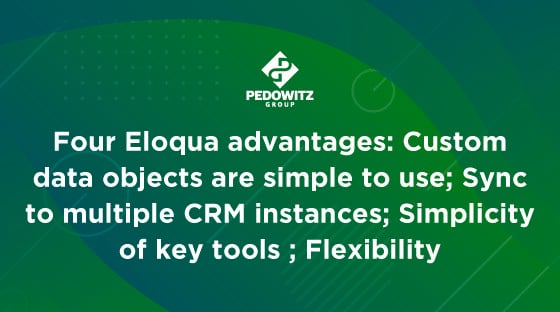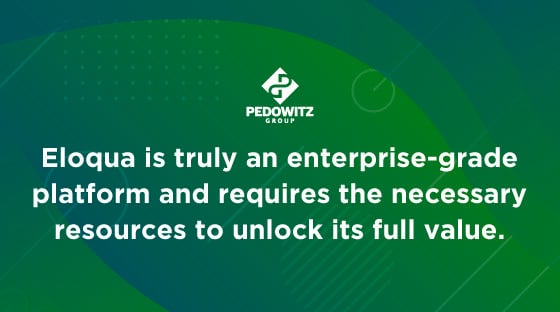Oracle’s Eloqua is a platform that would find itself well in a game such as Love It or Hate It.
In the game, someone names a thing, such as “pineapple on pizza!” and everyone else says if they love it or hate it. No in-between, no waffling … you have to go with your gut reaction. (Yes, there's also a board game version, for those who know!)
Eloqua typically inspires similar strong reactions from marketing operations folks.
Despite its reputation, I’m here to tell you something as one of TPG’s resident Eloqua experts: This platform has an exciting future – and it’s still underrated as a marketing automation platform (MAP).
Why?
Click here to jump to a particular topic: Best customization | Four advantages | How to get more
Or, start with its reputation in the marketplace:
Eloqua’s lackluster reputation? Not accurate!
Oracle did this to themselves, to be fair. Expectations were high when they bought Eloqua in 2012 for $871 million, but their investments slowed significantly as the decade wore on. The platform developed a reputation as something that wasn’t going to be updated.
Since 2020, they’ve really picked things up and have put a lot of work into the tool, including a Salesforce integration app that is far superior to the old way. That took significant development!
And it continues to this day. One advancement is Advanced Intelligence (no fluke it’s abbreviated “AI”) that might be comparable to Salesforce’s Einstein capabilities.
This is a real effort to help marketers be better marketers with predictable capabilities such as “will this subject line be successful?” or send time optimization.
Another is Eloqua’s focus on account-based marketing. A lot of other tools don’t allow you to look at the engagement of all the contacts within an account and present that as a score at the account level. It’s usually at the lead or contact level.
All this points to one fact: they’re planning on keeping Eloqua in the conversation as an industry leader for enterprise-level marketing automation.
Eloqua gives the best customization
The sheer amount of capabilities this platform offers well-resourced marketing teams is a major selling point, but as with all technology, this can be a blessing or a curse.
Blessing: There may not be a better MAP in the market for adapting to a business need.
Curse: Realizing that potential can be cumbersome without the right talent / consulting agency backing your team’s continued development.
This is why it’s a platform that truly embraces the term “enterprise-grade” and really isn’t for smaller companies. Proper investment can unlock so much within the tool, but you’ll need the resources in place to truly realize the value and make sure it’s set up the way your particular company needs it.

Four reasons I enjoy Eloqua:
These are speaking from personal experience, but these are some of the reasons why a company might consider this platform vs. other strong options on the market.
And as a shameless plug: We here at The Pedowitz Group work with all of them – and we’re platform-agnostic, so we’re never beholden to just one tool. I love that I can recommend for or against a platform based on what’s best for the client!
Now, why I think Eloqua has some advantages:
Custom data objects
In other platforms, they may either not have custom data objections as an option… or it’s quite difficult to write to them or add / remove data. In these cases, you often need an API to access the custom data.
With Eloqua, it’s just like another database table and can stuff your information in there for use in places such as dynamic content or with different custom integrations you may have in place.
Multiple CRMs? No problem!
Say you’re in a global enterprise with multiple instances of a CRM (often, we’re talking about Salesforce, though not always). I’ve worked with a client who has four.
Yes, you can integrate all of those instances into a single instance of Eloqua.
You can’t do that with any other marketing automation platform (at the time of the writing)!
This is one of those features that really cements the platform as enterprise-grade because it’s not uncommon to see different / multiple CRMs across business units and regions.
Having a MAP that meets all of the business’ requirements across these units / regions can be quite difficult to achieve, but it is massively impactful!
Far simpler than you’d think
Marketers tend to think of Eloqua as this behemoth of a tool sometimes. But there are email, landing page, and form tools that are quite easy to use.
One of the selling points other platforms offer is their ease of integration, but to be candid, integration is only ever a small piece of how you’d use any MAP. Your campaigns, underlying processes, data flows, and customer-facing content are all what you’ll spend far more time with!
Something I believe applies to most tech in your stack: You can always pay people to do the hard parts (like an integration or platform upgrade) … but it’s most important the day-to-day use is as easy as possible.
Marketers aren’t necessarily engineers, and they shouldn’t have to be.
Eloqua is up there in terms of ease of use!
Drag and Drop + Flexibility
Any modern tool makes it easy to get things done, right? Eloqua does that with its upgraded E10 interface and drag-and-drop functionality and flexibility within a given program.
I’ll let colleague Ann Cloutier take it from here:
“Many other platforms aren’t smooth in this operation, which really matters if you’re a power user who’s building and optimizing on a regular basis.
In addition, having worked with many of those said platforms, what really jumps out at me is how many options I have within a given campaign. I can easily (and quickly) trigger the integration to the CRM, remove from a campaign, insert a wait step, or alter a user’s progression onward.
This may sound simple, but it’s not in some other common tools.”

Privacy
I’ve noticed industries such as healthcare and financial services can often have higher rates of Eloqua adoption, and I think one of the reasons why is because this platform might be better than any other at preference management and privacy.
It can be something that falls to the back of the to-do list (and stays there), but for any global organization that’s serious about it, there are advanced GDPR capabilities. It’ss just a matter of bringing them to life for your customers!
Yep, we’re Eloqua experts (and more)
One of the things I love about The Pedowitz Group is we’re a partner with many of the major platforms – Eloqua included. But we’re not forced to sell a particular platform, because we’re platform-agnostic and my job as a consultant is to always do what’s best for the client.
Oracle is continuing to invest, and the platform continues to rival or outperform other enterprise-grade MAPs (marketing automation platforms) available on the market. But like any piece of your tech stack, it’s up to you on driving its full potential and value for the company.
We’ve worked with the tool since 2012 and continue optimizing it for leading clients today.
And our team of Eloqua experts (yes, including me!) is ready to help.
Want to keep reading? Try our getting started guide and data cleanup how-to.



